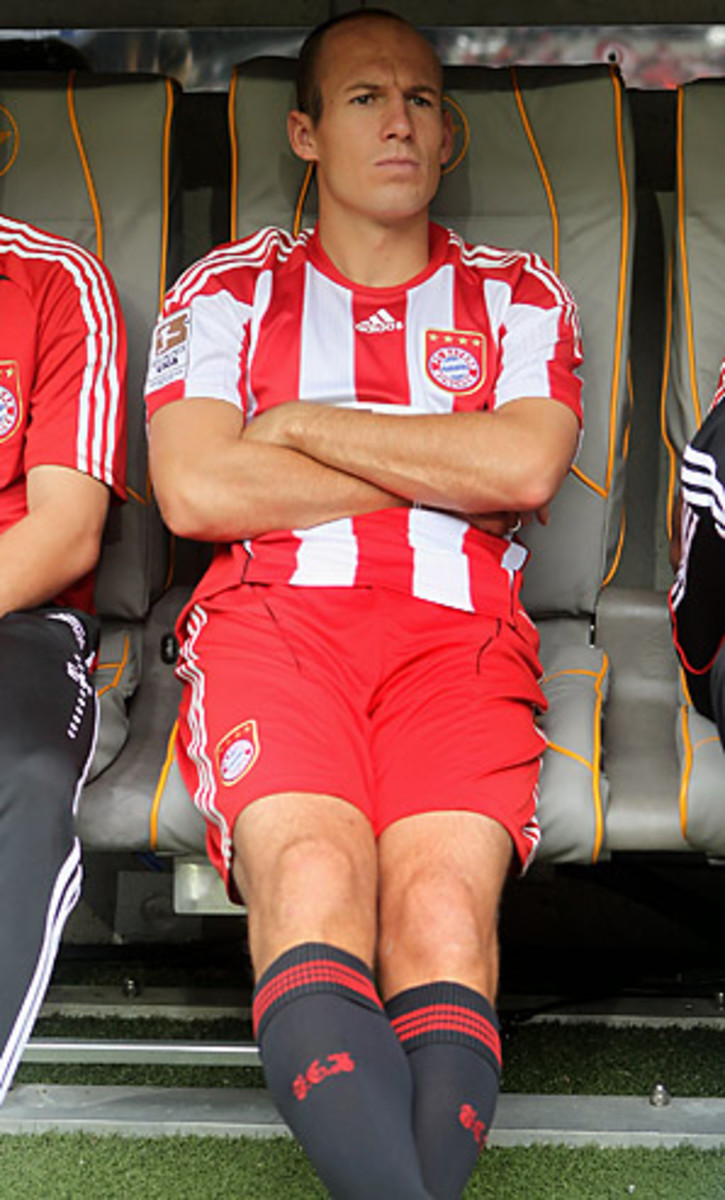Robben's injury absence revives issue of club-vs.-country liability
"You think about [it] a lot, still," the 26-year-old winger said at a news conference. "It had to be a goal, that was my fault. The chance to win a World Cup final doesn't come along that often. Maybe it will never come again."
One week later, it's become clear that a deeply felt sense of regret is the last thing that will trouble the Dutch winger in weeks to come. Something much more fragile than Robben's mind was damaged in South Africa: Tests on his left thigh revealed a 2-inch hole in the muscle, a serious injury that is expected to keep him out for two months, perhaps even longer.
"This diagnosis comes as shock," said Robben, who had reportedly played without pain in the final and had felt no adverse effect during his break.
Bayern is livid, because this setback isn't as unexpected as Robben indicated. "I've had a bad feeling about this from the start," Karl-Heinz Rummenigge, the German champions' CEO,said in Abendzeitung.
Robben hurt his hamstring in a pre-World Cup friendly against Hungary on June 4, but the Dutch FA diagnosed only a minor tear. The attacking midfielder went for treatment with Dick van Toorn, a Dutch physiotherapist renowned for his "aggressive methods," according to Robben. Whatever the 77-year-old Van Toorn did, it worked: Roben featured in five of the Netherlands' seven World Cup games.
Robben's latest thigh problem, opined van Toorn, must be "a new injury." But the evidence seems to contradict him. Bayern was given the results of the initial MRI scan from June and has found that the 2-inch hole was already there.
"It was irresponsible that it wasn't properly diagnosed by the Dutch," Bayern physician Hans-Wilhelm Müller-Wohlfahrt told the club's Web site. "He should not have been allowed to play."
Rummenigge knows all too well that players are prepared to gamble with their health in order to play in a World Cup. The former West Germany striker made it to finals in 1982 and 1986 despite not being fully fit. But the 54-year-old also believes that the Dutch FA went too far this time. The Bayern medical staff's repeated requests to check on Robben in June were turned down, in line with FIFA regulations, as national associations do not have to provide access to the players once they have been released by the clubs. The clubs, however, continue to pay the players, and, in Bayern's case, it will also pick up the tab during his enforced absence. Munich will pay Robben's full wages -- an estimated $7.7 million a year -- for the first three months of his layoff.
"When you hire a car, you have to bring it back in a decent state," Rummenigge said in Süddeutsche Zeitung. "Robben was taken from us, then put back in the garage as a wreck."
Bayern would like the "Oranjes" to reimburse it for the player's wages, about $1.3 million for two months, but there is little the club can realistically do to force the issue. FIFA pays all clubs that send players to the tournament a fee -- it was just a token $75,260 for Robben -- but neither the federation nor the Dutch FA bears any responsibility for injuries. The risk lies entirely with the clubs. Bayern is not the only employer to bemoan this lopsided arrangement. Arsenal threatened to sue when Dutch striker Robin van Persie was injured in a friendly with Italy last autumn. Real Madrid is suffering from Brazilian midfielder Kaká's controversial decision to delay knee surgery until after the World Cup. The 28-year-old midfielder will miss the next four months.
Other Bundesliga clubs have supported Bayern's strong stance on this issue. "The current situation is not satisfactory," VfL Wolfsburg sporting director Dieter Hoeness said. Schalke 04 manager Felix Magath believes the status quo is simply untenable. "It's crazy what the associations do," he told reporters. "The clubs pay but they're in charge. That doesn't go together."
There are ways, however, to address this problem successfully. After Bayern midfielder Sebastian Deisler suffered a serious knee injury in an international game in 2002, the German FA decided to insure all players who feature for them. FIFA had a similar arrangement in place for the 2006 World Cup, but not this time. And neither did the Dutch, who would have struggled to pay the enormous premiums for their star players, along with most of the smaller and medium-sized associations.
"There are vast financial differences between the various countries," Hoeness said. "That makes finding a centralized solution very difficult."
In his role as chairman of the European Club Association (ECA), Rummenigge will push FIFA and UEFA to adopt a different regime at the next tournaments. It would only seem fair that federations and associations accept at least part of the responsibility for injuries, but perhaps not all of it. Clubs would conversely never dream of remunerating them for vastly increasing the book value of their players during a competition. Bayern's Thomas Müller, for example, has become a much bigger asset by virtue of picking up the Golden Boot as leading scorer at the World Cup.
Robben, a player with a history of similar injuries, must also shoulder a portion of the blame. His recklessness is more excusable than the negligence of the Dutch doctors, but no one can really claim the moral high ground in this matter. Most experts believe that Bayern would have had few qualms about playing Robben in a Champions League final in similar circumstances.





